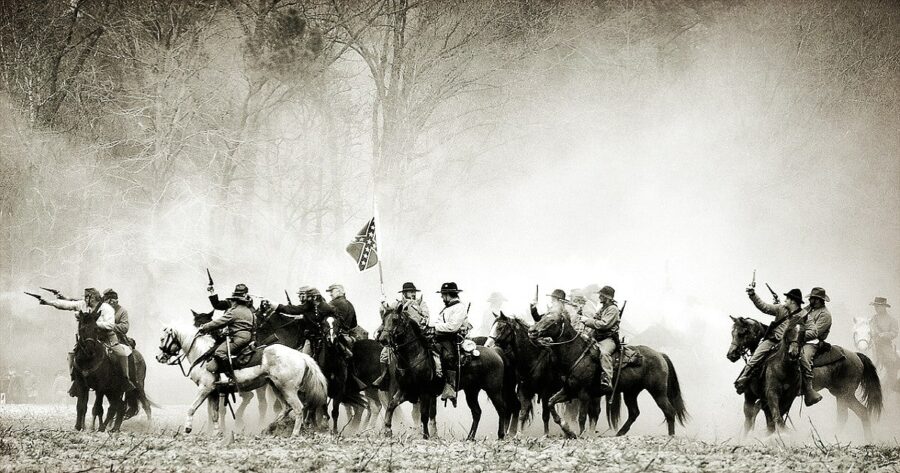The Lost Promise: The Devastating Role President Johnson Played In Field Order No. 15
- Kingston Bailey
- Southern USA
- Trending
- U.S.A
- May 1, 2023

Field Order No. 15, also known as the “Forty Acres and a Mule” order, was a landmark decision issued by General William Tecumseh Sherman in January 1865 during the American Civil War. The order was designed to provide land to newly emancipated African American families in the South, with the goal of ensuring their economic independence and helping to rebuild the region following years of devastating conflict. If Field Order No. 15 had been fully implemented and honoured, it would have had a profound impact on the landscape of America, particularly in terms of land and home ownership.
The issuance of Field Order No. 15 came in the aftermath of Sherman’s successful campaign to capture Savannah, Georgia, in December 1864. With the Confederate Army retreating, Sherman and his troops began to march northward, leaving behind a swath of destruction in their wake. As they moved through the South, they encountered large numbers of newly freed slaves who had been abandoned by their former owners and were struggling to survive in the midst of the war. In response to this humanitarian crisis, Sherman issued Field Order No. 15, which set aside a large swath of land along the coast of South Carolina, Georgia, and Florida for distribution to newly emancipated African American families.
Under the terms of the order, each family was to receive a plot of land no larger than 40 acres, along with a mule to help with agricultural work. The order also called for the establishment of settlements or “colonies” on the land, with schools, churches, and other necessary infrastructure provided to help support the newly established communities. The hope was that this land redistribution would help break the cycle of poverty and dependence that had characterized the lives of many enslaved people before the war and provide them with the means to support themselves and their families.
Although Field Order No. 15 was a bold and visionary decision, it was also highly controversial. Many white Southerners saw the order as a violation of their property rights, and there were fears that the redistribution of land to African Americans would upset the social and economic order of the South. Despite these objections, however, Sherman was committed to seeing the order through, and he began working to implement it in the early months of 1865.
Unfortunately, the hopes and dreams of newly emancipated African Americans were dashed when President Andrew Johnson took office following the assassination of President Abraham Lincoln in April 1865. One of his first actions was to revoke Field Order No. 15, effectively taking away the land that had been promised to thousands of newly freed slaves.
The impact of this decision was profound. Without access to land or other resources, many African American families were forced to return to the plantations and farms where they had been enslaved, working as sharecroppers under conditions that were little better than slavery. The promise of economic independence and land ownership that had been offered by Field Order No. 15 was lost, and the legacy of slavery and discrimination continued to shape the lives of African Americans for generations to come.
If Field Order No. 15 had been honoured and fully implemented, however, the landscape of America would have been dramatically different. With access to land and other resources, African American families would have had the means to build their own communities and establish themselves as independent landowners. This would have provided a foundation for economic growth and stability and helped create a more equitable and just society where everyone could succeed.
The legacy of Field Order No. 15 lives on today as advocates for racial justice continue to call for reparations and other forms of redress for the ongoing legacy of slavery and systemic racism in America. The concept of “40 acres and a mule” symbolizes the promise that was never fulfilled and is a rallying cry for those who seek to rectify past injustices.
Land ownership in America has always been a critical resource, and access to it has been a key factor in determining economic and social status. In the aftermath of the Civil War, land ownership became an even more pressing issue, as newly freed slaves sought to establish themselves as independent landowners and break free from the cycle of poverty and dependence that had characterized their lives for generations.
If Field Order No. 15 had been honoured, it would have provided a foundation for African American land ownership and economic independence. With access to land, families could have established their own farms and businesses, providing a source of income and stability for future generations. This would have created a ripple effect throughout society as African Americans gained greater economic power and influence and began to play a more significant role in shaping America’s political and social landscape.
Another important impact of Field Order No. 15 would have been on the issue of home ownership. Homeownership has long been considered a critical aspect of the American Dream and has been linked to economic stability and upward mobility. However, the dream of owning a home has been out of reach for many African Americans due to various historical and systemic barriers.
If Field Order No. 15 had been honoured, it would have provided a pathway to homeownership for thousands of African American families. With access to land, families could have built their own homes and established their own communities, creating a foundation for economic growth and stability. This would have had a significant impact on the issue of racial wealth inequality, which remains a major challenge in America today.
Field Order No. 15 was a visionary decision that had the potential to reshape the landscape of America, particularly when it comes to land and home ownership. If the order had been fully implemented and honoured, all Afro-Americans would have had 40 acres and a mule, providing a foundation for economic independence and social mobility. Unfortunately, when President Andrew Johnson rescinded the order, the promise of economic independence and land ownership was lost. However, the legacy of Field Order No. 15 lives on today, as advocates for racial justice continue to call for reparations and other forms of redress to rectify past injustices and create a more just and equitable society for all.








